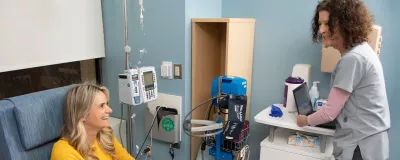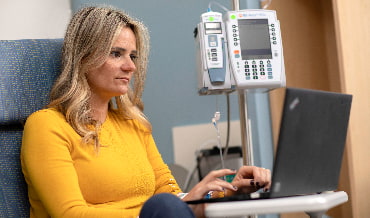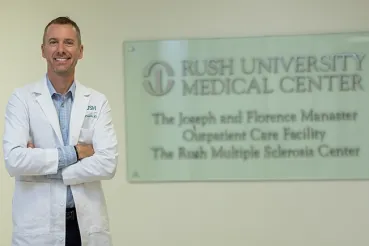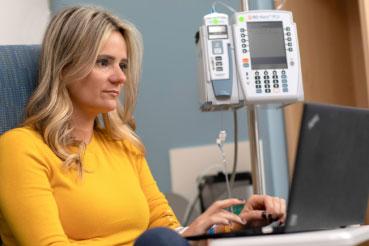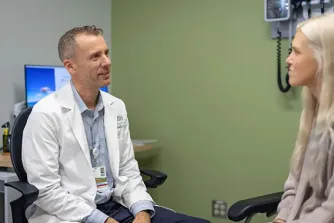The Rush Approach to Multiple Sclerosis Treatment
We understand that living with multiple sclerosis (MS) presents unique challenges for each person. That's why our nationally ranked team of MS specialists develops personalized multiple sclerosis treatment plans tailored to your individual needs.
At our Chicago location, we have a dedicated team of physicians, nurses, technicians and office staff who specialize in caring for MS patients. This expertise is why Rush University Medical Center is recognized as a National Multiple Sclerosis Society Center for Comprehensive Care.
The Rush MS Center has been working to move away from old models that separate types of medical care to a more collaborative approach. Whether you visit us in Chicago or at our clinics in the western suburbs, our neurologists work with other Rush specialists, building a team of physical therapists, occupational therapists and psychologists to provide the support you need.
Our comprehensive approach to MS treatment addresses all your needs. We provide psychological support, mental and physical rehabilitation, social services and exercise and nutrition programs to improve and maintain brain health. And with your team’s patient-centered education, you and your care partners will have the tools you need to understand and feel empowered to make decisions about your own health.
You don't have to navigate MS alone. Let us help you with our expert care and personalized treatment plans.
Angie's Story | Multiple Sclerosis Care at RUSH

Options for Multiple Sclerosis Treatment
Maintaining an active, healthy life is possible with the latest treatments for MS. The Rush Multiple Sclerosis Center at Rush University Medical Center in Chicago offers about 20 different therapies, from pills to injections to infusions.
Even if you’re diagnosed early and aren’t having severe symptoms, it’s best to start treatment as soon as possible. Those who start treatment early are less likely to reach certain levels of disability, like needing a cane or walker.
While we don’t yet know what initially triggers MS, and there’s currently no cure, treatment options have advanced over the last several years. Disease-modifying therapies (DMTs) can reduce relapses and protect against permanent damage. Together with medication to treat symptoms, such as muscle spasms or fatigue, and lifestyle modifications, like eating a healthy diet, DMTs are key to making MS manageable.
Because there are so many DMTs available, Rush physicians work closely with each patient to select which ones to use. Some patients take two pills twice a day; others have infusions twice a year. Your physician will talk about treatments that are appropriate for you, how effective they are and any risks or side effects.
Treatments can include the following:
- Oral treatments are pills or capsules. Some are taken daily. One newer medication, cladribine (brand name Mavenclad), is taken in two treatment courses, once a year for two years.
- Injectable treatments are injections that you can give yourself at home. The frequency can range from every other day to once a month.
- Intravenous infusion treatments are delivered through an IV during an infusion session that can last from one to three hours, at intervals that range from once a month to twice a year.
Infusion Therapy Treatment for Multiple Sclerosis at Rush
Rush University Medical Center provides comprehensive infusion therapy services for people living with multiple sclerosis, including the latest MS treatment options. By choosing Rush for infusion therapy, patients have access to the latest treatments and clinical trials. They can receive infusion therapy in private or semi-private, Wi-Fi-enabled infusion bays, while enjoying comprehensive care from Rush's team of nationally ranked neurologists.
Infusion therapies are among the most popular treatments. Nearly half of patients have chosen to be on ocrelizumab (brand name Ocrevus), a monoclonal antibody infusion that’s given twice a year. Rush was the first place in Illinois, and one of the first in the nation, to offer this medication.
While it’s possible for some DMTs to be infused at home, most people choose to come to the Rush Multiple Sclerosis Center for their infusions.
Each visit begins with a check-in meeting with a nurse who specializes in MS infusions. The nurse then administers the medication through an IV. Sometimes a pre-medication, like an antihistamine, steroid or pain reliever, is used to help ensure that there aren’t any side effects. And if someone has a reaction to a medication, the full Rush University Medical Center care team is right outside the door.
Ocrelizumab infusions take about six hours; other medications can take more or less time. Patients report that the process is very comfortable. Some people read; others work on their laptops or the iPads provided in each bay. And many people just use the time to relax.
Preparing for Your First Multiple Sclerosis Appointment at Rush
You can expect this first MS appointment at Rush to take an hour or longer. To start, your neurologist will talk to you about your symptoms and history. It’s often helpful to have someone you know attend with you so they can help you remember any details, especially about the timeline of when you started to experience your symptoms.
To prepare, it is best to come into that first meeting with some information handy. This will include:
- What kind of symptoms you’ve experienced.
- The full timeline of when your symptoms started and how they have progressed.
- What happened after the first few days or weeks after symptoms appeared.
- A full list of medications you take, including prescriptions, over-the-counter medications, medical marijuana, vitamins and supplements.
- Your history of smoking, recreational drug use or exposure to neurotoxins, such as certain heavy metals and chemicals.
- Your family history with MS and any other neurological disorders.
After this conversation, your physician will perform a physical exam and order some blood work to look at your blood count, electrolytes and basic metabolic profile.
Rush Excellence in Multiple Sclerosis Treatment
- High volume of patients: Providers at Rush typically see more than 3,300 patients with multiple sclerosis each year. We understand all the different MS symptoms people can experience — and which MS treatments work well to address those symptoms.
- Managing MS symptoms: We work with other Rush providers to address the full range of MS symptoms and how they affect your quality of life. This includes coordinating at-home therapy as needed. Our specialists can help with common MS symptoms, such as urinary incontinence, constipation, trouble walking, depression, tremor, spasticity, optic neuritis and sexual problems.
- Extensive experience with cladribine: Physicians at our downtown Chicago location participated in early clinical trials of the oral chemotherapy drug cladribine (brand name, Mavenclad). This means we have a deep understanding of its potential benefits and its side effects, plus how to address them. Cladribine can be effective in halting the destructive processes of MS and lowering the risk for disability progressing in patients with relapsing-remitting MS and secondary progressive MS.
- Treatment for PML: Rush multiple sclerosis specialists were among the first in the world to create a process for early detection and treatment for patients with MS who develop progressive multifocal leukoencephalopathy (PML). Our multiple sclerosis specialists in Chicago monitor patients, including with brain MRI, at three- to four-month intervals. The earlier we are able to detect PML, the better chance you have to manage this potentially life-threatening disease.
- Latest MS treatment options: The oldest and largest MS treatment center in the region, the center has pioneered new treatments and has also been the first to offer many new therapies. Multiple sclerosis specialists in downtown Chicago have long been active MS researchers through clinical trials and lab research. Rush played a key role in developing and/or testing a number of now FDA-approved MS drugs, including Tysabri, Ocrevus and Ampyra. That research means you have access to new treatments before they are more widely available.
- Private and semi-private infusion therapy: At our downtown Chicago location, we have 15 private or semi-private infusion therapy bays. Each is sterilized between each patient for your safety. We have a full range of infusion therapies for MS, including Ocrevus. Your MS doctor will discuss with you which infusion therapy is best for your situation.
Multiple Sclerosis Second Opinion at Rush
We understand the importance of receiving a second opinion when dealing with a complex condition like MS. At Rush, you can expect expert care, access to the latest treatment options and a collaborative approach to your care. To get a second opinion for your MS, simply schedule an appointment with one of our neurologists specializing in MS. We'll review your medical history, imaging and other relevant information to develop a personalized treatment plan that's right for you.
Facts and FAQs About Multiple Sclerosis
MS is a chronic, inflammatory autoimmune disease that affects the central nervous system. It looks different in everyone who has it — and you may know more people who have it than you think. In fact, one recent estimate suggests that the disease affects one in every 300 to 500 people.
Nerves in the brain and spinal cord are coated in myelin, a layer of protein and fatty substances that helps the nerves transmit signals quickly to the rest of the body. These signals control movement, vision, speech, swallowing and sensation.
When you have MS, your immune cells attack and break down the myelin sheath. Over time, the resulting inflammation damages the nerves, slowing or blocking the transmission of signals.
Most MS is the relapsing-remitting type. Inflammatory attacks on myelin that cause symptoms are called a “relapse,” which is followed by symptom improvements, or “remission.”
Symptoms depend on which nerves are damaged and which signals are interrupted. That’s why MS symptoms can vary so widely from person to person, and why the effects of the disease can be so unpredictable.
One of the key symptoms of MS is fatigue. Patients will sometimes feel a level of fatigue for years before further symptoms develop and they seek treatment. Other symptoms may include weakness or numbness in both legs and problems walking. Patients may also experience a loss of vision that is often painful.
No, there is no at-home test for MS. Diagnosing this disease can be very complicated, and in fact, there is no one specific test for it. Only a trained specialist can diagnose MS.
MS is very complex, and because there is no specific test for it, a trained neurologist will use many criteria to diagnose it. They will take a full patient health history and perform a physical examination. They’ll often do blood work and MRIs, and in some cases, they may do spinal taps. Using all of these results, they can diagnose MS with a degree of certainty.
We don’t currently know the cause of MS, but there are certain genetic and environmental risks that contribute. Up to 10% of patients with MS have a first-degree relative with the disease. A recent study also showed that Epstein-Barr virus, the virus that causes mono, is involved in the process of developing MS. Vitamin D deficiency and a history of smoking increase the risk as well.

